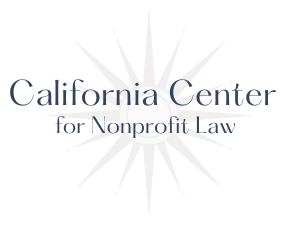
5 Internal Control Policies that Your Charitable Organization Should Implement
All charitable organizations should have certain policies and procedures in place to protect the organization, particularly when it comes to internal control concerning financial matters. One highly recommended practice is for charitable organizations to develop and implement internal control policies, which help safeguard the misuse and misappropriation of assets.
The California Center for Nonprofit Law is here to advise you about the various policies and practices that can help protect your public charity, including internal control policies. Contact our office to learn more about these and other important issues necessary to keep your charitable organization operating smoothly and complying with all federal, state, and local laws.
Internal control policies operate as “checks and balances” to help prevent crimes such as theft and embezzlement that can quickly drain a charity’s assets. Here are five internal control policies that your charitable organization should consider establishing and implementing.
- Policy Requiring Two Signatures on Checks – This simple internal control eliminates one person having sole control over the checks written on behalf of the nonprofit organization.
- Segregation of Duties Policy – This policy ensures that more than one person is responsible for financial duties concerning the organization. For instance, the person who receives and records checks should not be the same person who deposits checks to avoid any discrepancies. Likewise, the person who prepares payroll should not be the same person who maintains and distributes payroll checks.
- Review of Vendors – More than one person should regularly review a list of all vendors receiving fees or checks for goods or services from the charity. This policy can ensure that more than one person knows all legitimate vendors and expenses. It can also guard against a person who creates a fictitious vendor to embezzle money from the charity.
- Reimbursement of Employee Expenses – A charity should not reimburse employee expenses unless the executive director or a supervisor approves them in advance and in writing.
- Establish a Policy Outlining Access to and Authority to Use the Charity’s Financial Accounts – All charities should have a clear written policy on which staff members have access to the organization’s bank and credit card accounts. Furthermore, the policy should outline who has the authority to spend money on behalf of the organizations, whether via cash, checks, or credit cards. In many cases, organizations limit the ability of a staff member to spend over a certain amount without the approval of the executive director, a supervisor, or the charity’s governing body.
Contact Us Today for Legal Advice and Assistance
The California Center for Nonprofit Law concentrates its practice on legal matters that affect charities and other nonprofit organizations in California. Our unique focus allows us to keep ahead of constant local, state, and federal laws and policies as they develop over time. We are here to represent the interests of your nonprofit organization throughout every stage of your legal matter. Call us at (949) 892-1221, email us at info@NPOlawyers.com, or fill out our contact form online and schedule a consultation about your nonprofit organization today.
